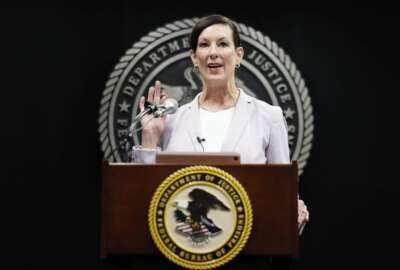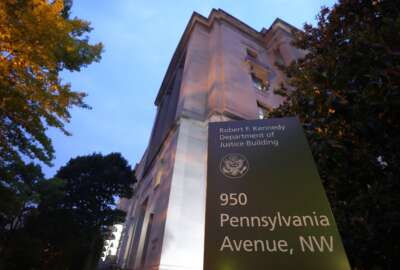A mildly amusing channel on Instagram, entitled “animals doing things,” features cute creatures, both wild and domesticated. Over the years, the number of animals doing things seems to have been exceeded by the number of people contriving situations to induce their pets to act silly. The contrivance plus the addition of background music have rendered the 15- or 25-second videos trivial and less compelling. Animal behavior is interesting enough all by itself.
My own work consists in part of talking to people doing things. Real things. So it never gets boring. A large part of the satisfaction is letting people tell the world — at least the world that listens to The Federal Drive With Tom Temin. There’s a few of you.
Things people do sometimes exhibit real, tangible innovation in long-running programs. This week I interviewed two career officials in the Supplemental Nutrition Assistance Program. Lisa Gifaldi and Shelly Pierce, together with Andrea Gold-O’Connor, are Service to America medal finalists. When the pandemic made it critical, they established online food shopping for users of SNAP cards. It required all sorts of technology plumbing, such as enabling 4-digit PINs, in websites that didn’t have it. Imagine calling up a big online retailer and convincing it to add a capability like that. But now 9% of SNAP activity is online, giving people in so-called food deserts vast new options.
That’s doing something that may look obvious in retrospect but turned out to require sustained effort.
Federal assistance take many forms. The State Department, together with partners from Yale, launched the Sudan Conflict Observatory Platform. As Susan Wolfinbarger described it in an upcoming interview, the observatory uses open source imagery, such as from PlanetScape Ai, and other data emanating from Sudan as factions there wage civil war. Modeled after an observatory set up for Ukraine, it lets aid organizations see exactly what’s going on and where.
That’s doing things with data that can ultimately help people in dire trouble not of their own making.
Just two examples of people doing things for quality in programs somehow connected to U.S. ideals. Remarkable to me is how they greatly amplified their agencies’ missions without massive infusions of new money.
The observatory in Ukraine got me thinking about the Russia business now grinding on. I still have a vague memory of the Cuban missile crisis, at least the memory of the grownups’ furrowed brows. Here in the U.S. we’re still free, sixty-some years later. But Russia, not so much.
As we head to the 4th of July, another thought about liberty. One of our tech guys here at the radio station loaned me a worn paper copy of With God in Russia. It’s the 1964 memoir — sensational in its day and still popular — by the Polish-American Jesuit priest Walter Ciszek, who died in 1984. As a young, idealistic evangelist, he snuck into Soviet Poland. He ended up spending 24 years in the Soviet prison gulag, a brutal, barbaric system within the equally brutal and barbaric USSR. Ciszek was released back to the United States late in the Kennedy administration as part of a prisoner exchange.
In one episode, Ciszek — because he is American — becomes the object of fascination and protection during a stay in one Siberian prison camp. The common criminal who rules the barracks with long knives and the easy willingness to use them is drawn to Ciszek. The man, who intimidates even the guards, is charmed into wonder and laughter by Ciszek’s descriptions of America. He asks Ciszek to repeat them over and over, like a child wanting to hear “Goodnight Moon.” The man is mesmerized not just by the material splendor of America, but also by the fact of freedom itself.
The American ideal thus burns so brightly, it illuminated an icy corner of a Siberian shack in the darkest and most distant reaches of human subjugation. What those who’ve sworn to uphold our Constitution ultimately sign on for is just the opposite: to help “establish Justice, insure domestic Tranquility, provide for the common defense, promote the general Welfare, and secure the Blessings of Liberty…”
Cue fireworks.
Nearly Useless Factoid
By Alyssa Miguel
Montpelier, Vermont, is the only U.S. capital without a McDonald’s.
Source: Business Insider
Copyright
© 2024 Federal News Network. All rights reserved. This website is not intended for users located within the European Economic Area.





